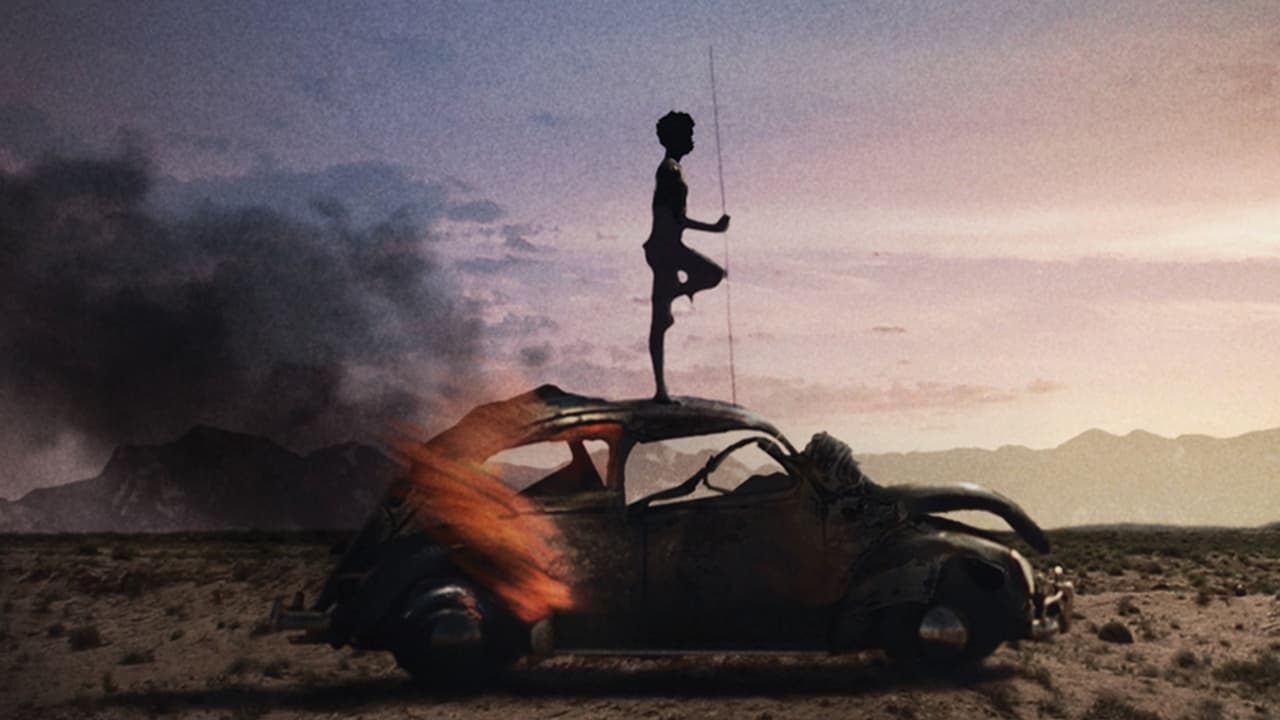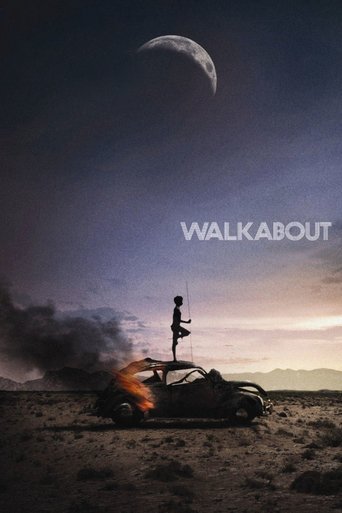

Despite flaws -- e.g. *very* sporadic and brief moments of didactic heavy-handedness -- this film wins a ten for pure originality and courage, sumptuous visual poetry, general respect for the audience's intelligence, and, perhaps most of all, for bringing the remarkable and thoroughly unique David Gulpilil to a career in film -- he's a revelation. His cultural icon status is well-deserved.I am about the same age as 'Walkabout''s main actors, and saw this film in the theater when it was released in the US in 1972, and saw it again last night (27 March 2017) on DVD. It made quite an impression on me as a kid -- reviewing it 45 years later I realized I remembered every shot save for the few and far-between clunky bits, which long ago my genius editor of a memory left on the cutting room floor of the mind. I do understand why some see the film as a stacked-deck screed re 'primitive indigenous beauty' vs. 'industrial white insanity'. Even were that part of the film-maker's original intent, what happens on the film (I say "on" the film as it is a story told in pictures) transcends any such reductive literal-mindedness. 'Walkabout' absorbed and transformed this humble viewer -- doing things only a film can do.The two-disc DVD I watched last night included excellent commentary by Nic. Roeg, and had a whole reel of extras including a fascinating documentary on Gulpilil as of 2002 I believe. The lean and tireless, elegant mature Gulpilil tells his story in his own words, with occasional commentary by experts on the social context of his career. Toward the conclusion one senses the real-time growing pressure on the subject caught between his traditional culture and the film business/'white-man' world -- his admitted substance and alcohol use, and bitterness at not accumulating the wealth of a 'Hollywood star'. Subsequently I read of his great troubles in recent years, and it is heartbreaking. I pray for him and his family, and trust his strength and giving spirit will prevail.
... View MoreIn the year of 1971, there were two good films about the modern human's conduct toward animals, nature, and themselves. These films are Walkabout & Wake in Fright, and both of them are visually stunning. However, Nicolas Roeg attempted in somehow to compare between the archaic humans and the moderns, which it was perfectly done. But I was kind of lost in what Roeg was trying to say, he didn't make me loathe the contemporary civilization, nor sense the privilege of living in the wild. In Wake in Fright, Kotcheff was obvious in what he was trying to say, without any comparison with another kind. But in Walkabout, I did not get the message behind the story of the black boy. Nevertheless, Walkabout was terrific on many levels.
... View MoreIf a nature documentary Attenborough style chooses the choicest shots, the majestic voice-over and score to elicit maximum excitement and wonder, Roeg's Walkabout does the opposite. It does not seek to amaze, but present an unflinching look at the Australian outback, where at any time you could be hundreds of kilometres from the nearest petrol station. Roeg shoots with a tenacity for the fauna and flora; horny lizards bathe in the ember sun, wombats prod at sleeping children, ant and flies are ever constant. The temptation to err and fleetingly capture Uluru in all its size and iconicity is rejected. He will zoom into a random incident of an animal devouring another, giving it no symbolic power but simply showcasing the harshness for what it is. And then he will zoom out from our characters, contextualising them and making them tiny amongst the crimson red hills of sand. Barry's score, with its cacophony of bleeps, high pitched shrieks, radio static and echidna paws trampling up dust, adds a hallucinogenic mood and makes the great stretches of land vast and infused with a haunting beauty. The trees respond to this and seem to shiver in the hot wind. Sometimes, he will forgo hard cuts and dissolve cliffs and mountains and other scenery against each other, as if to represent passing of time. But he never puts a definite marker on these periods; a crucial element of the story is the vagueness of this perception, as the pair wander confused, lost and desperate. Prior to this wandering, there is a wordless intro of sorts, where we survey the image of modernity in 70s Adelaide, but against the backing of a didgeridoo. Roeg is selective about inserting hints of this world with our main narrative. As our nameless Aboriginal boy on his walkabout hunts and skins a kangaroo, we crosscut over to a butcher who mimics the same actions; who tears at tendons with his hands rather than his teeth, but the intent is the same. Dangling and playing around trees is compared to a group of Indigenous women having their fun in the now burnt husk of the car. And in one moment where the two collide, and Barry's score kicks into a haunting gear, and we freeze-frame on animals escaping and reverse this again and again. But I do think in this instance it is a tiny bit over dramatic - it may be in little Luc's perspective, but is the objective of hunting quite so different? And then there is something which they both share, because it is the inescapable nature of humans. Jenny Agutter was 17 by the time that filming began and it was even more appropriate, as she neared adulthood. She has to continually reign in his younger brother, whom is oblivious to the situation, as well as deal with her developing sexuality. The sensual glances from the Aboriginal boy (and I think from the father too at the beginning, very subtly, who has recognised her physical growth) mirror those of the weather scientists towards their female colleague. Two teenagers will share glances at sensually formed branches in the dark, and as she explores the ruins of an old shack and the burial mounds of the inhabitants, he ha a wide grin on his face as he looks over. Roeg intercuts this with a extreme closeup of a termite burrowing its way out of the dirt ground, as if trying to form a conscious connection between the two worlds, but it is in vain. Likewise, when he performs a ritualistic mating dance, with clay smeared body paints, she shys away because she does not understand. But in some ways, in the stripped dialogue between the siblings, she does know a little. She is embarrassed of her nudity and hurries to clothe herself as he dances to the didgeridoo, but earlier, she is much more at ease twisting and sliding her way through the crystal clear pool, and there is almost a conscious sense of display at work. She understands a little then, but does not fully grasp this experience, even as Roeg fast forwards and presents us again with the image of modernity, inside that identical dainty little kitchen for the housewife. And we dissolve again, and she flashes back to that idyllic time in the pools. It is a remarkable achievement to make a film so balanced, so unbiased, so thoughtful of both sides - Roeg does not attempt to fetishsize the mystic power and authentic natural living of the Aboriginals in the outback, and there is no reward for the pursuit of it after throwing away the cityscape life. The boy is resourceful, but not in a wondrous way. The modern citizens are not caricatures for the way of harsh contrast (except perhaps for one fleeting moment at a plantation). And Roeg, having done this in 1971, as a British director, has a remarkable sensibility for the cultures involved, even as Aboriginal racial tensions waver today. The final scene is poetic powerful and completely devoid of any cultural, racial or sexual prejudice. But it becomes lost in time and memory. It is a dream, after all.
... View MoreA random walk in the desert.That's pretty much what this movie is. Starts randomly, continues randomly, ends randomly. The start was so implausible - clearly just a plot device to get the kids lost in the desert - that you have forewarning that this is not going to be a great movie.From then it's just random occurrences, some of which never get linked to the main plot. (Eg I still haven't figured out what the horny scientists and their balloons had to do with anything).I could have liked this even if it turned out to be what I suspected it was going to be: am overly politically correct essay on the clash of cultures between whites and native Australians. But, while it shaped up to be that one stage, that theme pretty quickly disappeared. However, we did have the director's massive overuse of jarring match cuts just to keep remind you about it, without progressing the discussion or actually saying anything constructive about it.Similarly, the director had a secondary urban vs rural sub-theme going through the movie, all through jerky back-and-forth match cuts. Yeah, yeah, we get it, and got it early, so no need to keep reminding us: city bad, country good, whites bad, natives good.Nope, the main plot is pretty much a random one. Kids stranded in desert, wander around, random things occur, meet native boy, wander around, random things occur.
... View More